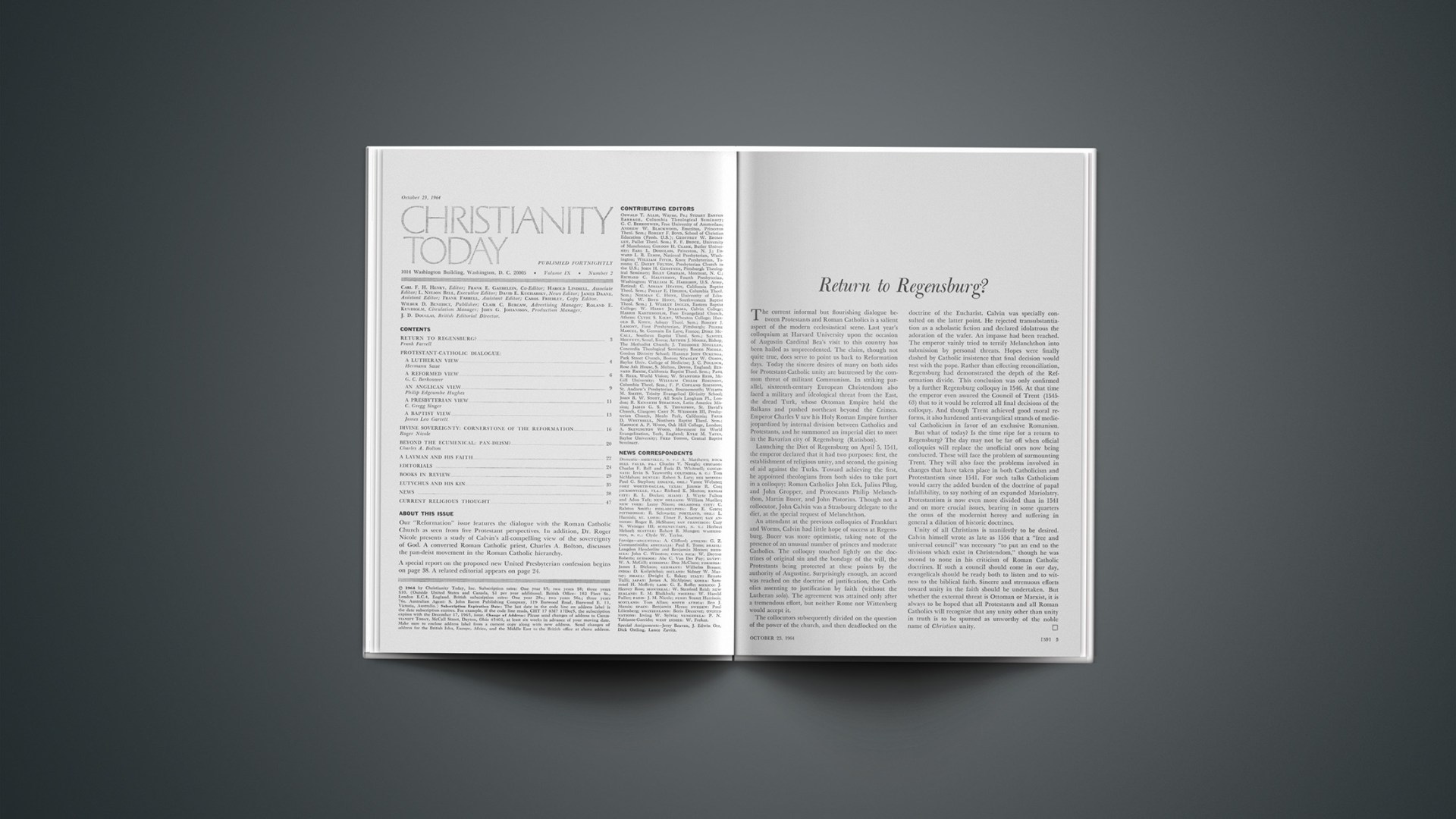The current informal but flourishing dialogue between Protestants and Roman Catholics is a salient aspect of the modern ecclesiastical scene. Last year’s colloquium at Harvard University upon the occasion of Augustin Cardinal Bea’s visit to this country has been hailed as unprecedented. The claim, though not quite true, does serve to point us back to Reformation days. Today the sincere desires of many on both sides for Protestant-Catholic unity are buttressed by the common threat of militant Communism. In striking parallel, sixteenth-century European Christendom also faced a military and ideological threat from the East, the dread Turk, whose Ottoman Empire held the Balkans and pushed northeast beyond the Crimea. Emperor Charles V saw his Holy Roman Empire further jeopardized by internal division between Catholics and Protestants, and he summoned an imperial diet to meet in the Bavarian city of Regensburg (Ratisbon).
Launching the Diet of Regensburg on April 5, 1541, the emperor declared that it had two purposes: first, the establishment of religious unity, and second, the gaining of aid against the Turks. Toward achieving the first, he appointed theologians from both sides to take part in a colloquy: Roman Catholics John Eck, Julius Pflug, and John Gropper, and Protestants Philip Melanchthon, Martin Bucer, and John Pistorius. Though not a collocutor, John Calvin was a Strasbourg delegate to the diet, at the special request of Melanchthon.
An attendant at the previous colloquies of Frankfurt and Worms, Calvin had little hope of success at Regensburg. Bucer was more optimistic, taking note of the presence of an unusual number of princes and moderate Catholics. The colloquy touched lightly on the doctrines of original sin and the bondage of the will, the Protestants being protected at these points by the authority of Augustine. Surprisingly enough, an accord was reached on the doctrine of justification, the Catholics assenting to justification by faith (without the Lutheran sola). The agreement was attained only after a tremendous effort, but neither Rome nor Wittenberg would accept it.
The collocutors subsequently divided on the question of the power of the church, and then deadlocked on the doctrine of the Eucharist. Calvin was specially consulted on the latter point. He rejected transubstantiation as a scholastic fiction and declared idolatrous the adoration of the wafer. An impasse had been reached. The emperor vainly tried to terrify Melanchthon into submission by personal threats. Hopes were finally dashed by Catholic insistence that final decision would rest with the pope. Rather than effecting reconciliation, Regensburg had demonstrated the depth of the Reformation divide. This conclusion was only confirmed by a further Regensburg colloquy in 1546. At that time the emperor even assured the Council of Trent (1545–63) that to it would be referred all final decisions of the colloquy. And though Trent achieved good moral reforms, it also hardened anti-evangelical strands of medieval Catholicism in favor of an exclusive Romanism.
But what of today? Is the time ripe for a return to Regensburg? The day may not be far off when official colloquies will replace the unofficial ones now being conducted. These will face the problem of surmounting Trent. They will also face the problems involved in changes that have taken place in both Catholicism and Protestantism since 1541. For such talks Catholicism would carry the added burden of the doctrine of papal infallibility, to say nothing of an expanded Mariolatry. Protestantism is now even more divided than in 1541 and on more crucial issues, bearing in some quarters the onus of the modernist heresy and suffering in general a dilution of historic doctrines.
Unity of all Christians is manifestly to be desired. Calvin himself wrote as late as 1556 that a “free and universal council” was necessary “to put an end to the divisions which exist in Christendom,” though he was second to none in his criticism of Roman Catholic doctrines. If such a council should come in our day, evangelicals should be ready both to listen and to witness to the biblical faith. Sincere and strenuous efforts toward unity in the faith should be undertaken. But whether the external threat is Ottoman or Marxist, it is always to be hoped that all Protestants and all Roman Catholics will recognize that any unity other than unity in truth is to be spurned as unworthy of the noble name of Christian unity.










